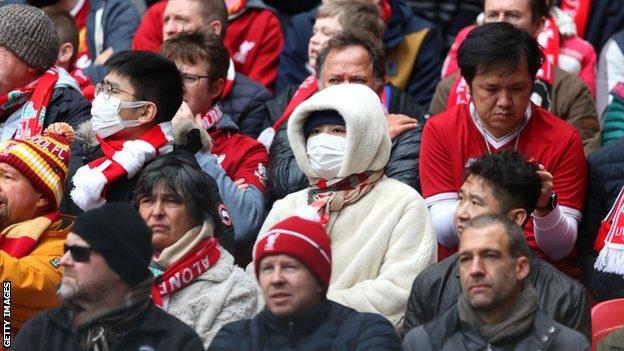Coronavirus: Premier League and EFL suspended in England - Scotland, Wales and Northern Ireland halt games
- Published
- comments

Some fans have been seen wearing protective masks at Premier League fixtures
Elite football in Britain has been suspended until at least 3 April as a result of the spread of coronavirus.
All games in England's Premier League, EFL, Women's Super League and Women's Championship, plus in Scotland,Wales and Northern Ireland, are postponed.
The Premier League said play will start on 4 April subject to "conditions at the time".
But BBC sports editor Dan Roan says resuming on the date is privately deemed "almost impossible".
FA chairman Greg Clarke is known to have expressed his fear at Friday's emergency meeting that the season may have to be abandoned.
England's international friendly matches against Italy on 27 March and Denmark four days later are off.
The EFL, which hopes to resume play a day earlier than the Premier League on 3 April, said clubs were also advised to suspend "non-essential activities" such as "player appearances, training ground visits and fan meetings".
The Euro 2020 play-offs have also moved closer to being postponed after Fifa recommended that all impending internationals should be called off.
Scotland, Northern Ireland and the Republic are all scheduled to play their semi-finals on 26 March, with the finals five days later.

The suspension comes on a day of widespread sporting postponements worldwide.
The London Marathon has been moved from 26 April to 4 October, with the Manchester and Brighton Marathons also postponed.
Uefa has postponed next week's Champions League and Europa League fixtures.
In rugby union, Saturday's Six Nations match between Wales and Scotland has been postponed, as has Sunday's Premiership Cup final between Sale and Harlequins.
Cycling's Giro d'Italia, scheduled to start in Hungary in May, has been called off.
England's Test cricket series in Sri Lanka has been cancelled.
Golf's opening major of the year, the Masters, has been postponed.
Formula 1 has called off the Vietnam Grand Prix on 5 April.
Formula E is suspended for two months, affecting races in Paris, Seoul and Jakarta.

Late on Thursday, it was announced Arsenal manager Mikel Arteta had tested positive for the virus, and early on Friday Chelsea striker Callum Hudson-Odoi revealed he had been affected, while Everton say a first-team player has shown symptoms.
Earlier this week, several clubs - including Arsenal, Chelsea, Leicester City, Bournemouth, Manchester City, Juventus and Real Madrid - revealed they have either all or some of their playing staff in self-isolation.
Premier League chief executive Richard Masters said: "In this unprecedented situation, we are working closely with our clubs, government, the FA and EFL and can reassure everyone the health and welfare of players, staff and supporters are our priority."
The Premier League said its "aim is to reschedule the displaced fixtures", while the Football Association said "all parties are committed at this time to trying to complete this season's domestic fixture programme".
On Thursday Prime Minister Boris Johnson said suspending major public events such as sporting fixtures was being considered by the government but would be a measure primarily to protect public services, rather than delay the spread.
The EFL said: "This decision has not been taken lightly, but the EFL must prioritise the health and well-being of players, staff and supporters while also acknowledging the government's national efforts in tackling this outbreak."
Football has also been suspended in Italy, Spain, France, the Netherlands, Portugal and the USA.
'Early April an impossible return' - analysis
Football suspension 'very worrying' for clubs - Rochdale CEO
Dan Roan, BBC sports editor
These are deeply worrying times for football - and for world sport - which is having to face up to a period of disruption and dislocation unprecedented in peacetime.
Privately, senior football figures admit that resuming the English league season in early April - when the initial suspension will be reviewed - will be almost impossible.
Their hope is that next week a decision is taken by Uefa to postpone Euro 2020 for a year, thereby freeing up space in the calendar to reschedule outstanding matches, and complete domestic league seasons across the continent at some stage.
The problem is that the outbreak is expected to be at its peak in May and June, so some within the game fear that if the suspension keeps on being extended, the season will have to be abandoned and declared void.
This would obviously be a nightmare scenario for the fans of Liverpool and Leeds United, who both stand on the brink of long-awaited glory. But it would also have severe financial ramifications for clubs, players, staff and broadcasters, along with the wider sporting industry.
Amid the threat of legal action and demands for refunds from season ticket holders, clubs will now be scrambling to check insurance policies and commercial contracts.
This a crisis no one saw coming.
And one that leaves a gaping hole in the country's cultural fabric at a tense and troubling time, when many people could do with the welcome distraction that football brings to so many.